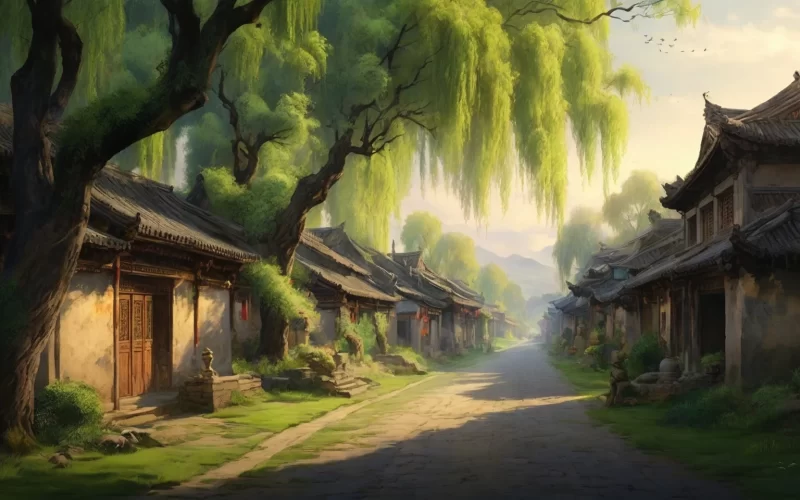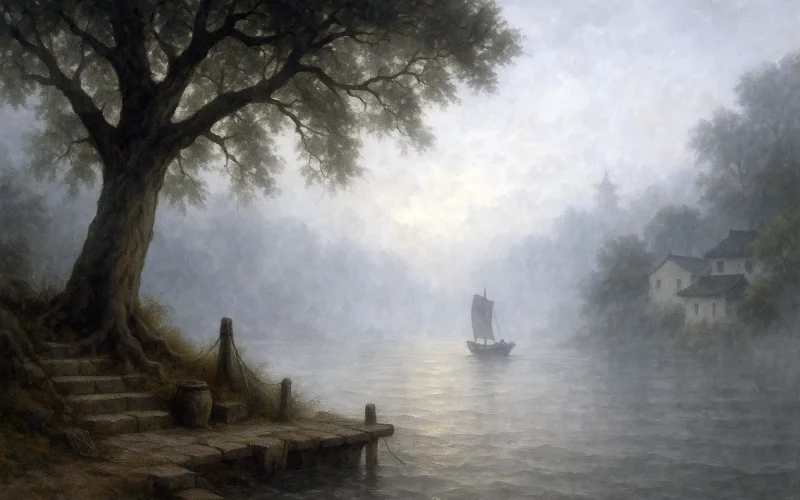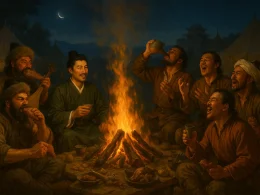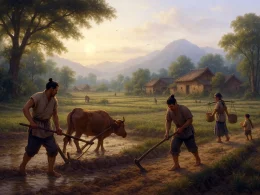Far through the night a harp is sighing
With a sadness of wind and rain in the strings...
There's a solitary lantern, a bugle-call --
And beyond Terrace Tower down goes the moon.
...Fragrant grasses have changed and faded
While still I have been hoping that my old friend would come...
There are no more messengers I can send him,
Now that the wildgeese have turned south.
Original Poem
「章台夜思」
韦庄
清瑟怨遥夜,绕弦风雨哀。
孤灯闻楚角,残月下章台。
芳草已云暮,故人殊未来。
乡书不可寄,秋雁又南回。
Interpretation
This poem was composed during the turbulent late Tang Dynasty, when regional warlords fractured the empire and perpetual warfare displaced countless scholars. The poet, stranded in Yuezhong region, penned these lines amid severed communications and national chaos—a masterpiece blending profound homesickness with lament for a crumbling world.
First Couplet: "清瑟怨遥夜,绕弦风雨哀。"
Qīng sè yuàn yáo yè, rào xián fēngyǔ āi.
A zither's pure notes grieve through endless night,
While storm-winds wail round strings in woeful flight.
The opening establishes an auditory landscape of melancholy. The "zither's lament" (瑟怨) and "storm's moan" (风雨哀) fuse human artistry with nature's voice, externalizing the poet's isolation.
Second Couplet: "孤灯闻楚角,残月下章台。"
Gū dēng wén Chǔ jiǎo, cán yuè xià Zhāngtái.
A lone lamp hears Chu's battle-horns resound,
As waning moon sinks past palace grounds.
Visual and aural elements deepen the desolation. The "Chu battle-horn" (楚角) signals wartime displacement, while "Zhangtai terrace" (章台)—symbolizing lost capital splendor—underscores exile's anguish.
Third Couplet: "芳草已云暮,故人殊未来。"
Fāng cǎo yǐ yún mù, gùrén shū wèi lái.
Sweet grasses fade in twilight's hue,
Yet long-awaited friends come not to view.
Seasonal imagery ("fading grasses") mirrors abandoned hopes. The "absent companions" (故人) motif reflects severed social bonds in turbulent times.
Fourth Couplet: "乡书不可寄,秋雁又南回。"
Xiāng shū bùkě jì, qiū yàn yòu nán huí.
No homing letters southward fly,
Though autumn geese return on high.
The concluding paradox—migrating geese ignoring human messages—epitomizes communication breakdowns during war. The "homing geese" (秋雁) motif amplifies the poet's trapped helplessness.
Holistic Appreciation
This exquisitely conceived poem progresses through four thematically interwoven couplets, moving from the melancholic strains of a night rain zither and the solitary lamp beneath a waning moon, to the disappointment of fragrant grasses bearing no messages and southbound geese failing to deliver letters. The emotional arc evolves from plaintive melancholy to profound resignation.
The poet masterfully employs scenic imagery to convey emotion - transitioning from "clear zither" to "Chu frontier horns," from "waning moon" to "autumn geese" - these elements not only accentuate the desolation of exile but also mirror inner solitude and sorrow. Throughout the poem permeates an intense zeitgeist, with its backdrop of "perpetual beacon fires" and "severed communications" transforming this work beyond mere homesickness verse into a poignant meditation on national turmoil and human transience.
Artistic Merits
This poem demonstrates remarkable linguistic precision and profound imagery, masterfully employing auditory and visual elements - the melancholy zither tones, distant bugle calls, fading meadow hues, and migrating geese silhouettes - as vessels to convey the poet's profound sorrow and resignation. The verses flow with a haunting, melancholic grace, their compositional structure gradually intensifying emotion through spatial progression from intimate scenes to expansive vistas, from external observations to internalized reflections. This technique epitomizes the late Tang poetic aesthetic characterized by elegiac beauty and contemplative gravity.
Particularly noteworthy is the poet's exquisite handling of symbolic imagery: the "clear zither" (清瑟) evokes cultural refinement amidst desolation, the "solitary lamp" (孤灯) becomes a metaphor for intellectual isolation, while the "waning moon" (残月) symbolizes the fading light of dynastic glory. These carefully crafted images significantly enhance the poem's emotional resonance and allegorical depth, transforming personal lament into a timeless meditation on transience.
Insights
The poem's enduring power stems from universalizing displacement. Its "failed messenger geese" motif speaks to modern refugees and digital-age isolation alike. The poet demonstrates how precise natural imagery can crystallize collective trauma—a lesson for writers documenting crises across eras.
Poem translator:
Kiang Kanghu
About the Poet:
Wei Zhuang (韦庄), circa 836 - 910 A.D., a native of Xi'an in the southeast of Shaanxi Province, was a scholar and a minister of the Ministry of Revenue. There is a collection of “Raccoon Flower Collections” in circulation.












